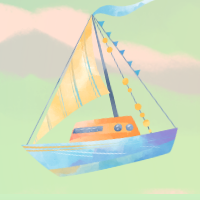
Embrace the Minimalist Mindset
First and foremost, living on a small sailboat requires a shift in mindset. Space is limited, and everything you bring aboard needs to serve a purpose. Think of your boat as a floating tiny house: every inch matters. You’ll want to pare down your belongings to the essentials, focusing on quality over quantity.
Start by asking yourself what you truly need to live comfortably. Chances are, you’ll find that the luxuries of land life—multiple sets of dishes, endless gadgets, or a closet full of clothes—don’t make the cut. Instead, prioritize multifunctional items, durable gear, and anything that adds real value to your day-to-day life aboard.
Maximize Your Storage Space
On a small sailboat, efficient storage is your best friend. Clever use of vertical space, hidden compartments, and multi-use furniture can turn even the tiniest of boats into a functional living space. Every nook and cranny on your sailboat has the potential to store something useful, so get creative!
Opt for collapsible or nesting kitchenware, which takes up less room, and look for storage solutions that can double as seating or counter space. Soft-sided storage bags and vacuum-sealed bags can help compress clothing or bedding to save even more space.
Energy Independence: Powering Your Life at Sea
One of the most rewarding aspects of off-grid living is generating your own power. On a sailboat, solar panels and wind turbines are popular choices for harnessing renewable energy. Solar panels are relatively easy to install and maintain, making them ideal for charging batteries to run your lights, electronics, and essential systems like navigation and refrigeration.
Wind turbines are another excellent option, particularly in regions with consistent breezes. While they may not generate as much power as solar panels on calm days, they can be a great supplemental energy source when you’re on the move or in windy anchorages.
Water, Water Everywhere (But Not a Drop to Drink)
Water conservation is crucial when living off-grid on a sailboat, especially when you’re far from shore and fresh water is limited. Most small sailboats are equipped with water tanks, but these can only hold so much. Being mindful of your water usage is key to comfortable, long-term off-grid living.
Consider investing in a watermaker, which converts seawater into drinkable water using reverse osmosis. This can give you more independence, especially when cruising in remote areas. Otherwise, you’ll need to plan your trips around marinas or islands where you can refill your water tanks.
To conserve water, develop the habit of using less. Simple things like turning off the tap while brushing your teeth or washing dishes with minimal water can make a big difference.
Cooking and Eating at Sea
Your galley (boat kitchen) may be small, but that doesn’t mean you can’t enjoy delicious, wholesome meals. With a bit of planning and organization, you can create meals just as satisfying as anything cooked on land. Opt for compact, reliable cookware, and consider a stove with a gimbal (a pivoting mount) to keep your pots and pans steady while cooking in rough seas.
Stock your pantry with non-perishable, space-saving items such as canned goods, pasta, rice, and freeze-dried foods. Fresh produce is great, but when space is tight, focus on items that store well and require minimal preparation. Since your fridge (if you have one) will likely be small, get creative with long-lasting vegetables like potatoes, carrots, and onions.
Staying Connected, Safely
While living off-grid is about disconnecting from the hustle and bustle of modern life, safety and communication remain essential, especially at sea. Equip your boat with a VHF radio for local communication, and consider satellite phones or other communication devices for staying in touch when you’re in more remote areas.
It’s also important to keep track of weather conditions and plan accordingly. A portable GPS or navigation system will be indispensable for ensuring your routes are safe and that you’re always prepared for sudden changes in the environment.
Finding Balance: Life at Sea
Living off-grid on a small sailboat is about more than just downsizing your possessions or harnessing renewable energy. It’s about finding a balance between adventure and simplicity, between the thrill of the unknown and the comfort of a cozy, self-sufficient home.
Yes, there will be challenges: tight quarters, limited resources, and the unpredictability of the sea. But with a minimalist mindset and a passion for the lifestyle, you can embrace these challenges and turn them into opportunities for creativity, growth, and a deeper connection with nature.
So, are you ready to embrace life at sea? The horizon is calling, and with a bit of preparation and a love for the minimalist life, you can sail off into the sunset—living comfortably, sustainably, and free.
Whether you’re already planning your off-grid sailboat adventure or just daydreaming of life on the water, this minimalist approach can make the experience not only manageable but incredibly rewarding. Safe travels, and happy sailing!


